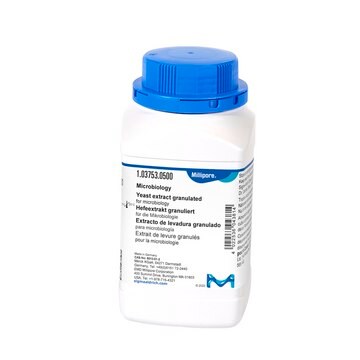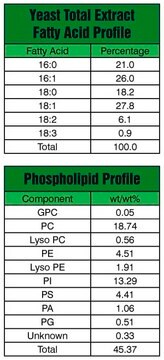Y1000
Select Yeast Extract
powder, BioReagent, suitable for cell culture, suitable for insect cell culture
Synonym(s):
Cell culture tested Yeast Extract
About This Item
Recommended Products
Agency
suitable for SM 5210
Quality Level
product line
BioReagent
form
powder
technique(s)
cell culture | insect: suitable
cell culture | mammalian: suitable
solubility
H2O: 10% (remains clear after heating to 40°C.)
shipped in
ambient
storage temp.
room temp
InChI
1S/C19H14O2/c20-18(21)11-17-15-8-4-3-7-14(15)16-10-9-12-5-1-2-6-13(12)19(16)17/h1-10,17H,11H2,(H,20,21)
InChI key
GQNBDGXKDJSVGQ-UHFFFAOYSA-N
Looking for similar products? Visit Product Comparison Guide
Application
- as a component of nutritive medium to culture the parasite from the egg to the third infective larval stage
- in yeast extract peptone dextrose (YPD)-medium/YPD agar and buffered complex glycerol (BMGY/BMMY) medium to culture Pichia pastoris transformants
- to prepare nutrient medium and growth medium for the larval development assay (LDA) using gastrointestinal nematode parasite eggs
Other Notes
Storage Class Code
11 - Combustible Solids
WGK
WGK 1
Flash Point(F)
Not applicable
Flash Point(C)
Not applicable
Personal Protective Equipment
Certificates of Analysis (COA)
Search for Certificates of Analysis (COA) by entering the products Lot/Batch Number. Lot and Batch Numbers can be found on a product’s label following the words ‘Lot’ or ‘Batch’.
Already Own This Product?
Find documentation for the products that you have recently purchased in the Document Library.
Customers Also Viewed
Related Content
This page is intended to make it easier to find the consumables you need based on the analytical method you’re using. Methods included on this page come from the EPA, Standard Methods and ASTM.
Our team of scientists has experience in all areas of research including Life Science, Material Science, Chemical Synthesis, Chromatography, Analytical and many others.
Contact Technical Service










